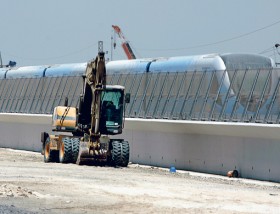Dubai: For many Dubai residents, it will be an exciting new way of getting around the city, but, according to a Dubai-based psychiatrist, the Metro, opening on September 9, 2009, will also be an opportunity to reduce stress and improve the quality of life for thousands of commuters.

The Dh15.5 billion driverless railway, which will cater to an average of 1.2 million passengers a day and deliver around 17 per cent of the public transport needs of the emirate, is on target for its September Red Line opening, which will see up to 40 trains every hour moving along 52km of track.
The journey along Shaikh Zayed Road from Al Rashidiya to Jebel Ali will stop at 29 stations – including Burj Dubai and Dubai International Airport. The Green Line is expected to open in March 2010, when 18 more stations will serve an additional 22.5km of track.Dr Arne Brosig of the German Centre for Neurology and Psychiatry (GNP) in Dubai Healthcare City explained how various benefits associated with Metro commuting as an alternative to using the car will boost individuals’ and the city’s productivity.
“Many studies have shown a significant relationship between reduced stress and better professional performance. For instance, the US Transportation Research Board carried out a field study when a New York commuter rail line was improved and found increased work productivity and reduced commuter stress. Commuters who switched to the new train service also experienced a reduced level of job strain after the implementation of the line.
“When driving the car during rush hour, commuters need to be continuously mindful of traffic rules, speed limits, traffic lights, jams, other drivers, accidents on the road, pressure of delays, being late for appointments and aggression of other drivers. The list is endless and all contribute to stress levels. Of course, there will also be other stress factors encountered on the way to and from the Metro station, but overall it is likely to result in a sizeable reduction in daily stress levels for thousands every day,” he said. Dr Brosig maintained: “Stress has a close relationship with work productivity. The higher the stress level when you start your working day, the smaller is the coping ability for the rest of the day.
“For instance, if you damage your car on the way to work, then you are unlikely to be as productive throughout the working day as you would have been arriving fully relaxed. This is not restricted to work productivity, but all other aspects of life and health can be influenced by stress.
“There is a certain amount of stress which is good and actually helps to improve performance. We call this ‘Eustress’.
“However, after a certain point, when stress becomes too much it will reduce a person’s productivity. This is called ‘Distress’. However, it is impossible to predict individually which amount of stress is too much for someone, because the same stress factor, such as a traffic jam, can be dealt with totally different by two different people, depending upon the overall stress level of the individual and the coping mechanisms this person uses to deal with stressful situations.”
A study by the US Centre for Disease Control and Prevention (CDC), which recommends a basic daily fitness regime of walking 10,000 steps, discovered that train commuters walked an average of 30 per cent more steps every working day than car drivers.
It also found more than 40 per cent walked at least 10,000 steps a day, compared with just over 14 per cent of car commuters.
















